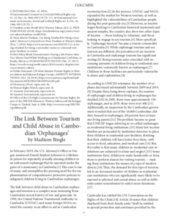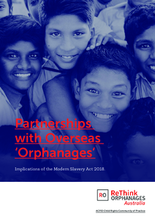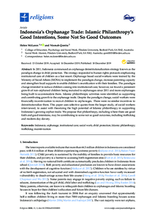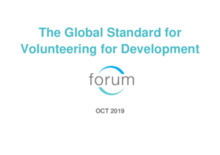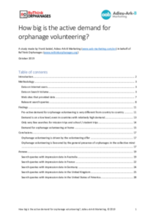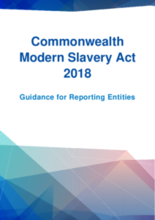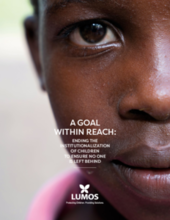Displaying 41 - 50 of 141
This column from Volume 23 of the American University Washington College of Law Human Rights Brief explores the links between child abuse in Cambodian orphanages and tourism.
This briefing note was developed by ReThink Orphanages Australia and the ACFID Child Rights Community of Practice to assist entities in Australia and abroad who have orphanages in their supply chains and/or operations to understand the implications of Australia’s Modern Slavery Act 2018.
This paper uses selective quotes from a larger study of social workers interviewed to assist with theorizing the high potential of Islamic philanthropy in supporting Indonesia’s growing orphan trade.
This book highlights exploratory research that examines the links between modern slavery practices and orphanage tourism. It was edited by Joseph M Cheer of Wakayama University, Leigh Mathews of ALTO Consulting, Kate van Doore of Griffith University, and Karen Flanagan of Save the Children Australia.
This episode of the podcast Up/Root features interviews with Stephen Ucembe and Ruth Wacuka who both grew up in "orphanages," despite having parents. They share what it was like to grow up in an institution and what they are doing to help end orphanage tourism - and how listeners can join them in their pursuit of justice for families and children.
The International Forum for Volunteering in Development (Forum) has developed The Global Standard for Volunteering for Development (the Global Standard) to help organisations understand and deliver Responsible and Impactful Volunteering, and to encourage learning and continuous improvement in development projects involving volunteers. The Global Standard offers key actions and indicators for each of the four themes - Designing and Delivering Projects, Duty of Care, Managing Volunteers, and Measuring Impact - including several indicators related to orphanage volunteering.
On 18 October 2019, the UK Government updated its guidance on gap years and volunteering overseas to include an advisory on volunteering at and visiting orphanages abroad.
This research gathers data on the volume of search queries that indicate an intention to do orphanage volunteering in a foreign country in order to gauge the pro-active demand for this type of volunteering in five different countries (Australia, France, Germany, United Kingdom, United States of America).
This guidance, which was developed for businesses and other organisations required to report under Australia's Modern Slavery Act 2018, offers a case study on orphanage trafficking as well as information on orphanage trafficking as a form of modern slavery and how entities can identify it in their operations and supply chains.
This report from Lumos defines the global problem of institutionalization of children - including the factors that drive it and the harmful impacts it has on children's physical and cognitive development - and proposes global solutions in line with the Sustainable Development Goals.

